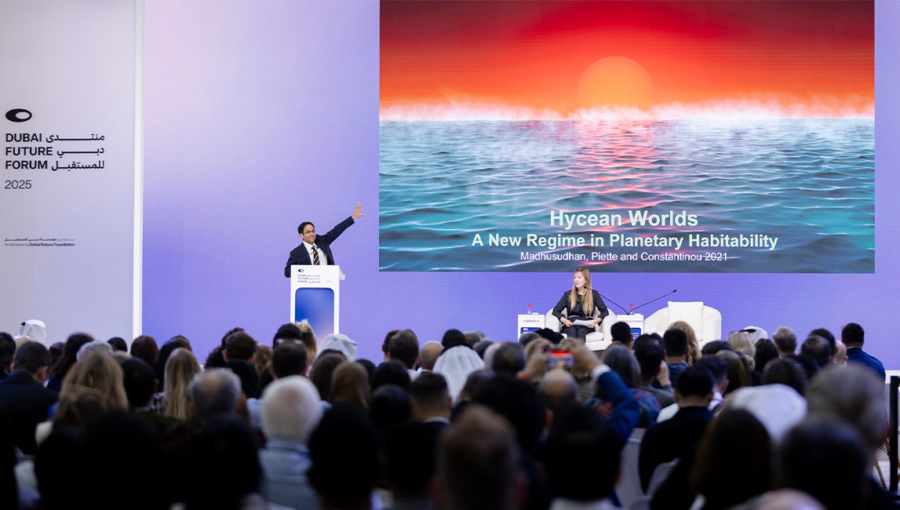Humanity may be within a decade of discovering life beyond Earth, according to Dr Nikku Madhusudhan, Professor of Astrophysics and Exoplanetary Science at the Institute of Astronomy, University of Cambridge. Speaking on Wednesday at the Dubai Future Forum in a session titled “From Molecules to Stars: What’s Next?”, he noted that more than 6,000 exoplanets have been identified in recent decades.
Discussing K2-18b (an exoplanet of growing scientific interest), Dr Madhusudhan said researchers are “95–99%” confident about the presence of a carbon-based molecule that could indicate life. “What we may be seeing is the first contact with a potentially habitable environment,” he said. “For the first time in thousands of years, we are seeing data about potential life beyond our planet.”
He added: “In my mind, the question is not whether we will find life, because there’s a good chance we will, the question is: are we prepared to find life as we don’t know it?”
In “Urban Futures in Action: What Is Dubai’s Model for People Centric Cities of the Future?”, His Excellency Marwan Bin Ghalita, Director General of Dubai Municipality, highlighted Dubai’s progress toward becoming a “20-minute city”, noting that in some areas essential services are already reachable within five minutes. He said: “Dubai is home and hope. It has become a true home for many nationalities. Whenever you have hope in a place, you begin to grow, plant roots, and develop there. This is what makes visitors wish to return to live and work in Dubai.”
In “City Life OS: What Happens When We Recode Cities Around Shared Experiences?”, Adam Scott, Co-Founder of the Experience Foundation, called for “an intervention” in the way the world thinks about urban architecture. “Developers and investors today often reduce people to a ‘unit’ living inside another ‘unit’, standardised spaces that overlook our human need for identity, culture, and community. We need an intervention. We need to rethink the way we build cities from the ground up, drawing on 65,000 years of human history to create places where people can truly thrive.”
Speaking in “Reimagining Our Cities: What Does Belonging Mean in a Changing World?”, Professor Lesley Lokko OBE, Founder and Chair of the African Futures Institute (AFI), noted: “People often think of the future as a destination. For me, the future is a process; a continuous journey of becoming that we are all part of.”
In the afternoon, Dr Alioune Sall, Founder and Executive Director of the African Futures Institute, joined Riel Miller, Founder of xperidox global, for the “In Conversation with Foresight Greats” series, discussing how foresight practice continues to evolve and adapt.
Closing the Day 2 plenaries, authors, curators, and filmmakers convened for “Future Stories: What Futures Are Possible Through Sci-Fi?” to explore how science fiction expands our capacity to imagine — and build — better futures, and how storytelling shapes collective visions of utopic possibility.
